Does your company track company vehicle cost? Did you ever wonder if you charge enough for their usage back to the client?
One way of doing this is using some of the advanced features in the Units Info Center. In the unit definition there is a field called Credit Account. If you put a valid financial account into this field, Vision will start posting offsetting credits for any unit that has cost assigned to it, similar to what the Job Cost Variance account does.
How can we use this to our advantage? Let’s say we created a couple of units to charge our company vehicles out either by mileage or by day use. We assign not only a bill-out rate to this unit but also an internal cost rate. Then we assign a newly created indirect expense account to the Credit Account. Let’s call this account Vehicle Cost Variance.
| Account | Description | Account Type |
|---|---|---|
| 780.00 | Vehicle Cost Variance (Generic) | Indirect |
The internal cost rate is the amount you want to charge each project for the vehicle usage. At first this will be a bit of a guess but over time we can get quite a good handle on that cost.
| Unit Id | Description | Cost Rate | Cost Account |
|---|---|---|---|
| V01 | Vehicle 01 | 100 | 750.01 |
So at this point every time you use your company vehicle on a project you should add the appropriate amounts of vehicle units to this project regardless of you planning to charge the unit out to the client or not.
In our sample we would charge 3 days of our Vehicle 01 Unit to our project. This will add cost of 300$ to the regular project but also offset it with a 300$ credit to our Vehicle Cost Variance account.
If you now use the same account to capture all vehicle related cost (lease, gas, maintenance, etc…) we start deducting from the accrued credits. After some time you will be able to see if you charge enough, too much or too less for your vehicles internally by simply checking the balance of this account.
Tracking Multiple Vehicles
If you want to track multiple vehicles there are two possible solutions depending on your needs:
- If you need to see each vehicle separate on a financial report (balance sheet, income statement, etc…) you will have to use a separate financial account for this. I suggest to use sub-numbering in this case so you have vehicle cost variance accounts like 750.01, 750.02, 750.03, … This will still allow you to group all vehicle variance accounts into one subtotal.
- If you should not need the split in financial reporting and it will be sufficient to look at the separate numbers only once in a while then I suggest to create an overhead project for vehicle cost and then add a phase for each vehicle. You can use these separate phases then to set up the unit credits and also for vehicle cost postings.
I suggest to use option 2 if possible at all since it will be easier to manage over time.
Here’s the setup for it:
| Account | Description | Account Type |
|---|---|---|
| 580.00 | Vehicle Cost Generic (Reimbursable) | Reimbursable |
| 580.01 | Vehicle Cost Vehicle01 (Reimbursable) | Reimbursable |
| 580.02 | Vehicle Cost Vehicle02 (Reimbursable) | Reimbursable |
| 680.00 | Vehicle Cost Generic (Direct) | Direct |
| 680.01 | Vehicle Cost Vehicle01 (Direct) | Direct |
| 680.02 | Vehicle Cost Vehicle02 (Direct) | Direct |
| 780.00 | Vehicle Cost Variance (Generic) | Indirect |
| 780.01 | Vehicle Cost Variance (Vehicle01) | Indirect |
| 780.02 | Vehicle Cost Variance (Vehicle02) | Indirect |
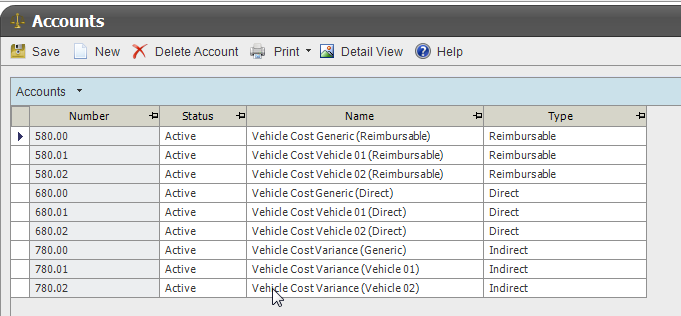
The overhead project with separate phases for either the generic vehicle of one for each vehicle you want to track.
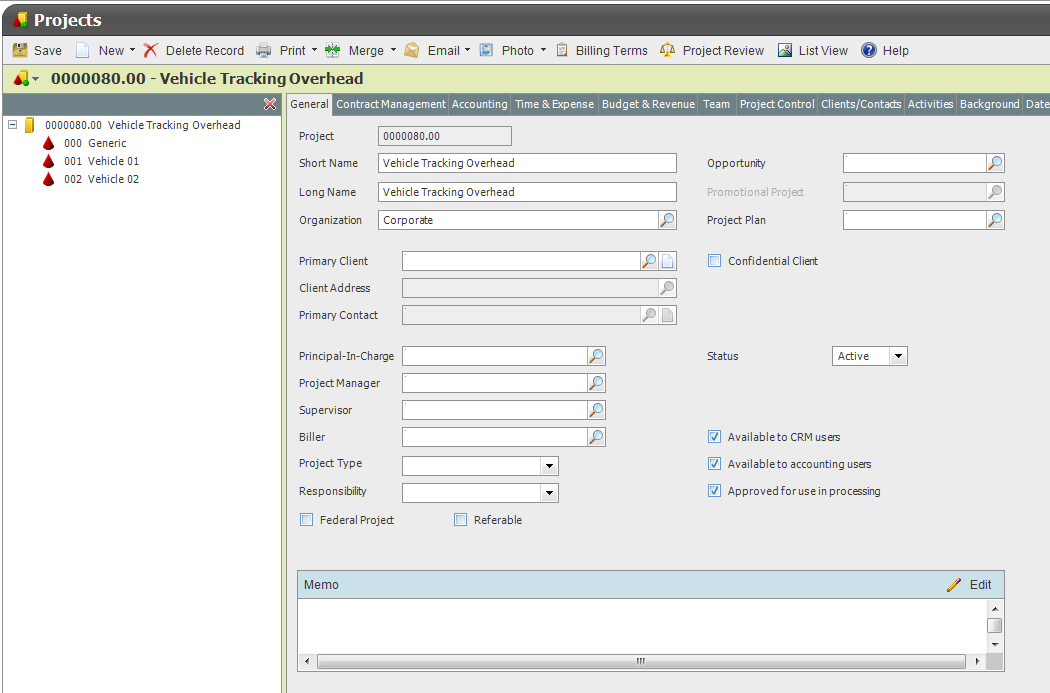
Then set up the unit with either the generic vehicle cost variance and specific tasks
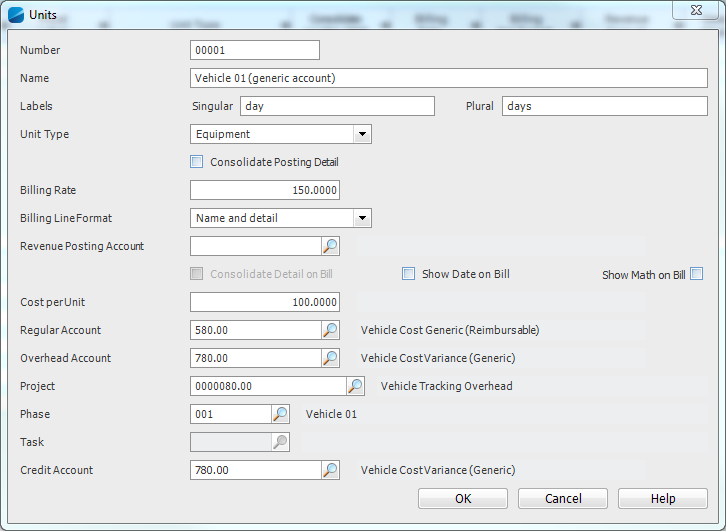
Or set up the unit with specific vehicle cost accounts and a generic project/phase.
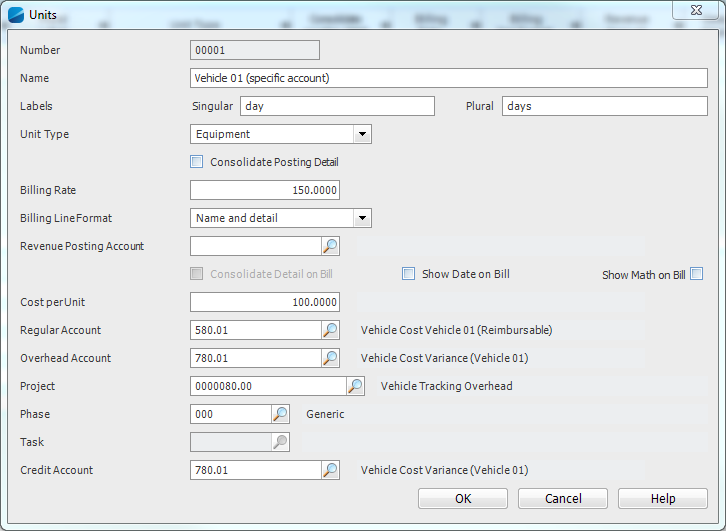
Integrating With The New Asset Management
If you own Vision’s new asset management you can now use the same accounts to connect the asset’s depreciation and capture the depreciation amounts in the vehicle offset account(s).
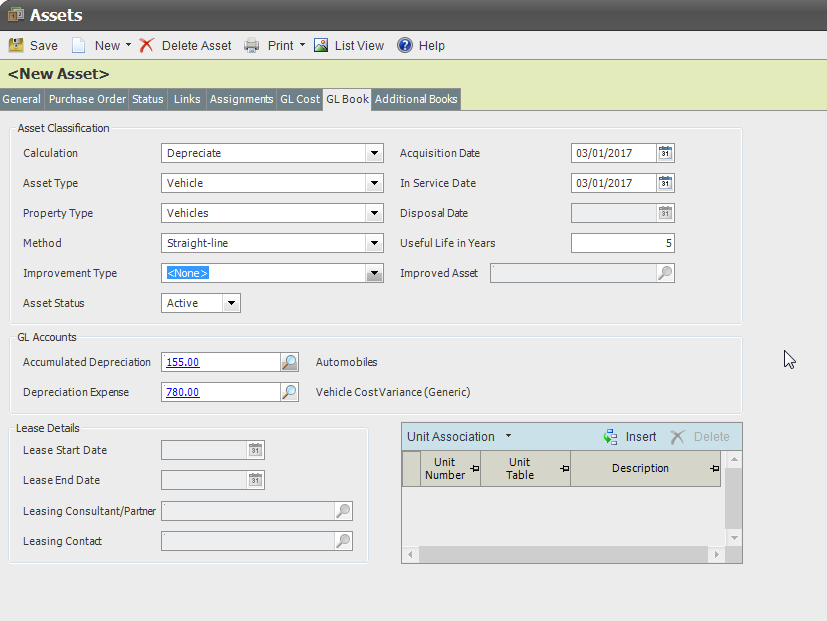
Conclusion
With this approach you have tight control over your overall vehicle cost and you can make sure that you charge out the appropriate values to your projects and clients.

